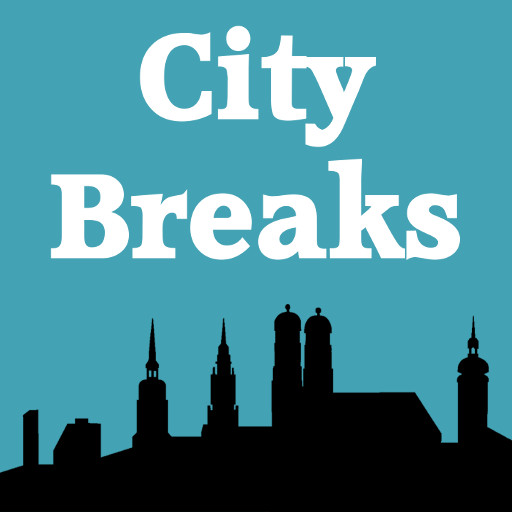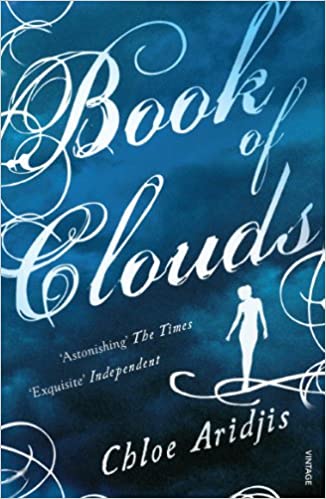Every author who sets a work in Berlin brings a different slant: new ideas which often show the city in an unexpected light. So, here are eight novels to inspire you. Read them before or after you go ….. or take them with you! Or maybe just use them as inspiration, even if you’re not off to Berlin any time soon.
Effi Briest by Theodor Fontane
This 19th century classic, the German equivalent of Anna Karenin or Madame Bovary, shows a woman on whom society places many expectations and asks how, or maybe if, it is possible for her to find personal happiness without sacrificing her place in respectable society.
The story is set partly in the stultifying countryside outside Berlin and partly in the city. Effi, married off young by her parents to the worthy but considerably older Baron von Instetten, causes a scandal when she is seen walking out with another man. Society will now reject her, reason her parents, who do the same so as not to become outcasts themselves. Can it possibly end in anything but tragedy?
The Luminous Life of Lilly Aphrodite by Beatrice Colin
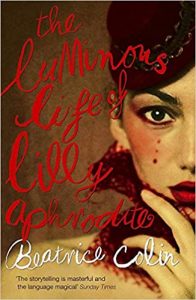
Born just as the 20th century was beginning, Lilly is soon orphaned and must make her own way. Her path through Berlin’s nightclubs to success in the film world takes the reader through German history during the first half of the 20th century.
On a cold February day in 1912 for example, the teenage Lilly joined the crowds to watch Kaiser Wilhelm travel down Unter den Linden. ‘She glimpsed his face, his huge dark moustache, his withered arm, and the sweep of his pale hair’, writes the author, going on to explain that six years later Lilly would see the Kaiser again, by chance, in a train station. But he wouldn’t notice her because ‘His eyes would be too full of tears.’ Between the two meetings, of course, came World War One and Germany’s defeat.
Goodbye to Berlin by Christopher Isherwood
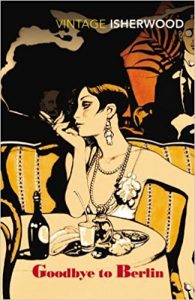
The narrator, a young Englishman living in Berlin, reveals the city as it was in the 1930s, glamourous, sleazy, dangerous. Isherwood describes a café near the Memorial Church where ‘Jews and left-wing intellectuals’ meet, knowing that ‘almost every evening, the SS men came into the café.’ Sometimes they dragged someone out and took them away and until they were gone, ‘you could have heard a pin drop’.
At a party spilling out onto the lawn of a lakeside villa owned by the narrator’s Jewish friends, there are footmen serving glasses of claret, there is music and chatter, but the guests, says the author, are ultimately doomed. The evening, he writes, ‘is like the last night of an epoch.’ Goodbye to Berlin is the author’s farewell to the city he is leaving, but also to a way of life which was about to disappear for ever.
Alone in Berlin by Hans Fallada
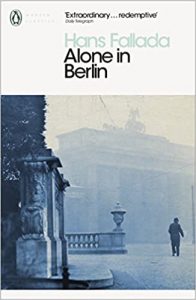
Published in 1947, this novel is a German author’s description of what the war did to ordinary Germans. Otto and Anna Quangel’s son has been killed at the front and they find the only way they can think of to criticise the regime which has robbed them of their only child. Then they carry it out, whatever the costs might be.
They write anti-Nazi slogans on postcards and leave them secretly all over Berlin for others to find. Their naivety, quite endearing at first, soon makes the reader terrified at the risks they are taking. As a New York Times reviewer said, to read this book is to have a wise ghost on your shoulder who whispers into your ear, ‘This is how it was. This is how it happened.’
Fatherland by Robert Harris
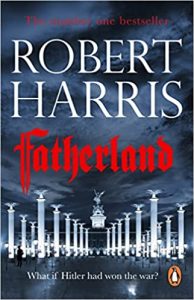
This alternative vision of a Germany which won World War Two is also a detective story, playing out in 1964 with the Gestapo and a 75 year-old Hitler in the background.
Instead of being reduced to rubble, the Berlin in Fatherland is full of gleaming new streets, an Avenue of Victory and an Arch of Triumph. The latter, says a tour guide showing a coach full of tourists around, is so enormous that ‘the Arc de Triomphe in Paris would fit into it forty-nine times.’ Reading about this fifteen-storey show-off building, ‘with the vaulted, shadowed roof of a cathedral’, will make you think anew about Berlin and what might have been.
The Spy Who Came in from the Cold by John Le Carré
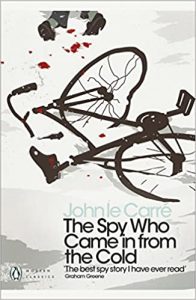
This classic, the spy story which inspired so many more spy stories, will take you deep into East Germany and show you the terrifying reality of East Berlin under communist rule. The story is, as a Guardian reviewer described it, about ‘a complicated act of deadly triple-bluff perpetrated by the British Secret Service against its enemies in the German Democratic Republic.’
Le Carré’s plot is gripping, and the small details add to the tension, such as when he describes a cabin at the checkpoint, lit up by arclights to catch any would-be escapees. He then describes the Wall as ‘a dirty, ugly thing of breeze blocks and strands of barbed wire, lit with cheap yellow lights like the backdrop for a concentration camp.’
Friedrichstrasse 19 by Emma Harding
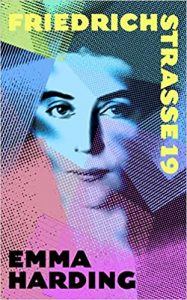
Friedrichsstrasse stood right by the Berlin Wall on the eastern side and this story of those who lived at number 19 throughout the 20th century gives you snapshots of the city’s history. Through Sigi you will enter the life of a cabaret singer before the war; Heike talks about leaping down from the Wall in 1989 into the arms of a stranger; Tonja joins the terrorist Red Army Faction in the 1980s.
And Ilse recalls hiding in a petrol tank in order to escape into West Berlin: ‘The shaking and the bumping and the noise and the terrible heat. We only drove about ten miles, but it felt like an eternity. I realised how stupid I’d been. That nothing could be worth dying for in that way, in that metal tomb.’
Book of Clouds by Chloe Aridjis
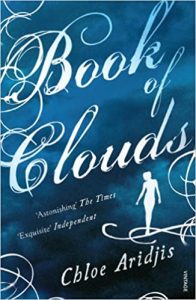
Tatiana arrives in Berlin from Mexico and tries to make her way, finding a job, but also spending a lot of time drifting round the city, seeing it with an outsider’s eye. Her descriptions – of ‘marzipan bears with raisin eyes’ in shop windows and of ‘the greasy smell of bratwurst’ being cooked on the street – bring today’s Berlin alive.
Tatiana’s reflections on Berlin’s past, which she senses all around her, illuminate the city’s history. At the Holocaust Memorial, she describes her disorientation: ‘it was like walking among 2711 upended sarcophagi, 2711 souls awaiting judgment, in an ad hoc graveyard devoid of markings or inscriptions.’
Two Anthologies
And lastly, we recommend two excellent anthologies which are choc full of literary (and non-literary) extracts set in Berlin: City Lit Berlin Edited by Heather Reyes and Berlin, A Literary Guide for Travellers by Paul Sullivan and Marcel Krueger
Listen to the podcast
Reading for this post
Effi Briest by Theodor Fontane
The Luminous Life of Lily Aphrodite by Beatrice Collin
Goodbye to Berlin by Christopher Isherwood
Alone in Berlin by Hans Fallada
Fatherland by Robert Harris
The Spy Who Came in from the Cold by John Le Carré
Friedrichstrasse 19 by Emma Harding
Book of Clouds by Chloe Aridjis
City Lit Berlin Edited by Heather Reyes
Berlin, A Literary Guide for Travellers by Paul Sullivan and Marcel Krueger
Last Updated on November 5, 2025 by Marian Jones
